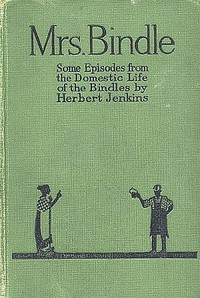Adventures of Bindle by Herbert George Jenkins (shoe dog free ebook txt) 📗

- Author: Herbert George Jenkins
Book online «Adventures of Bindle by Herbert George Jenkins (shoe dog free ebook txt) 📗». Author Herbert George Jenkins
"A daughter o' the Lord didn't ought to be afraid of an 'Un;[Pg 96] besides, you can go round an' 'old 'Earty's 'and. 'E's a rare ole 'ero when there's guns goin' off."
"I knew I shouldn't get any sympathy from you," complained Mrs. Bindle, rising and proceeding to bang away the breakfast things. When Mrs. Bindle was suffering from any great stress of emotion, she expressed her feelings by the noise she made. Ironing gave her the greatest opportunities. She could bang the iron on the ironing-board, back again to the stand, and finally on to the stove.
"I got to earn a livin'," remarked Bindle philosophically as he proceeded to light his pipe. "It's war-time too, an' nobody can't afford to move, so pore ole Joe 'as to take any ole job 'e can get 'old of."
"You lorst your last job a-purpose," snapped Mrs. Bindle.
Bindle looked at her sharply. Sometimes Mrs. Bindle's accuracy in things where she could not possibly possess knowledge was startling. Bindle had temporarily relinquished his situation in the Removal Department of Harridge's Stores in order to become caretaker at Fulham Square Mansions whilst his intimate, Charlie Hart, had a fortnight's holiday.
Mrs. Hart had been ill, and the doctor said that change of air and scene were essential to her recovery. She could not go alone, and if Mr. Hart went with her and a substitute were obtained, he would in all probability, as Charlie put it, "pinch my bloomin' job." Bindle he knew he could trust, and so it came about that for a fortnight Bindle was to "sleep out."
"Well, you see," Bindle explained, "I couldn't disappoint ole Charlie——"
"And what about me?" demanded Mrs. Bindle, looking round from a fierce attack upon the kitchen stove with the poker.
"Well," said Bindle slowly, "you're a disappointed woman as it is, Mrs. B., so you ain't 'urt."
Mrs. Bindle resumed her attack upon the fire with increased vigour.
"You always was a selfish beast, Bindle," she retorted. "You'll be sorry when I'm dead."
Any reference by Mrs. Bindle to the remorse that he would suffer after her death, Bindle always regarded as a sort of "take cover" signal. Mrs. Bindle was hysterical, and Bindle liked to be well out of the way before the storm broke. He had heard, but had never had an opportunity of testing the statement, that without an audience dogs will not fight and women will never have hysterics.[Pg 97]
When, therefore, Mrs. Bindle referred to what Bindle widower would suffer on account of what Bindle benedict had neglected to do, he rose, picking up the faded blue-and-white cricket-cap he invariably wore, and walked towards the door.
"There'll be a lot o' tips, ole Charlie says," he remarked, "an' I'll buy you somethink. I'll run in every day to see you ain't gone off with 'Guppy.'"
"You're a dirty-minded beast, Bindle," raged Mrs. Bindle; but her words beat up against the back door, through which Bindle had vanished. He had become a master of strategical retreat.
Whistling shrilly, he proceeded along the Fulham Road in the direction of Fulham Square Mansions. Bindle was in a happy frame of mind. It would be strange if a fortnight as porter at Fulham Square Mansions did not produce something in the way of a diversion.
"Cheer-o, uncle!" The remark came from a brazen-faced girl waiting for a bus.
Bindle frowned as he looked her up and down, from the low-cut transparent blouse to the short skirt, reaching little below her knees.
"If I was your uncle, young woman," he remarked, "I'd slap you into becomin' decent."
The girl jumped on to a bus that had just drawn up, and with a swirl of skirt and wealth of limb, waved her hand as she climbed the stairs.
"So long, old dear!" she cried.
"Got enough powder on 'er face to whitewash 'er feet," remarked a workman to Bindle as he resumed his walk.
"Women is funny things," responded Bindle. "They never seems to be wearin' so little, but wot they can't leave orf a bit more."
"You're right, mate," replied the man when he had digested the remark. "If I was the police I'd run 'em in."
"Well," said Bindle philosophically, "there is some wot likes to see all the goods in the window. S'long!" and he turned off the Fulham Road, leaving the workman to pursue his journey puzzling over Bindle's enigmatical utterance.
"'Ullo, Charlie!" greeted Bindle, as he entered the porter's lodge of Fulham Square Mansions. "'Ere I am, come to take care of all the little birds in the nest wot you're a-leavin' behind."
Charlie Hart was a big man with a heavy moustache, a brow whereon the creases of worry had a perpetual abiding-place, and[Pg 98] an indeterminate chin. "Charlie ought to wear a beard," was Bindle's verdict.
"Glad you come, Joe. I'll 'ave time to go over things again. Train don't go till four."
During the next few hours Bindle was once more taken over the salient features of the life of a porter at a block of residential flats. Charlie Hart had no system or order in conveying his instructions, and Bindle saw that he would have to depend upon his own wits to meet such crises as arose.
Mrs. Sedge, Mrs. Hart's mother, would look after those tenants who did not possess servants.
"She's all right when she ain't after 'Royal Richard,'" explained Charlie Hart.
"An' who's Royal Richard?" enquired Bindle with interest.
"Gin!" was Charlie Hart's laconic response.
Charlie enumerated the numbers of the flats, the occupants of which were to be "done for." One thing he particularly emphasised, Number Six was temporarily vacant. The owner was away; but it was let furnished from the following Monday to a Miss Cissie Boye, who was one of those to be "done for." Bindle was particularly cautioned to see that there were no "carryings on," whereat he winked reassuringly.
Mrs. Sedge was a stolid matron, whose outlook on life had reached the dregs of pessimism.
"Oh! don't ask me," was the phrase with which she warded off any attempt at conversation. Hers was a soul dedicated to Royal Richard and silence.
"Cheery little thing," was Bindle's summing up of the gloomy Mrs. Sedge.
Bindle had not been in charge an hour before Number Seven began to get troublesome. He was a choleric ex-Indian civil servant.
"Where's that damned fellow Hart?" he roared, thrusting his head into the porter's lodge.
"'E's gone to the damned seaside," replied Bindle imperturbably, as he proceeded to light his pipe with elaborate calm. "Taken 'is damned wife with 'im," he added.
Number Seven gasped.
"And who the devil are you?" he demanded.
"Well," replied Bindle with a grin, "on the 'Alls I'm Little Tich; but 'ere I calls myself Joe Bindle, known as ''Oly Joe.'"
For a moment Number Seven, his customary redness of face transformed to purple, stood regarding Bindle fiercely.[Pg 99]
"Then be damned to you!" he burst out, and turning on his heel, dashed upstairs.
"I ain't lived with Mrs. B. nineteen years without learnin' 'ow to 'andle explosives," remarked Bindle as he settled down to read an evening newspaper he had discovered in the letter box.
Bindle soon discovered that the life of a porter at residential flats is strangely lacking in repose. Everybody seemed either to want something sent up, or came to complain that their instructions had not been carried out.
The day passed with amazing rapidity. At eight o'clock Bindle stepped round to The Ancient Earl for a glass of beer. When he returned at nine-thirty he found his room in a state of siege.
"Oh, here he is!" said someone. Bindle smiled happily.
"Where the devil have you been?" demanded Number Seven angrily.
Bindle looked at him steadily. Having apparently established Number Seven's identity to his entire satisfaction, he spoke.
"Now look 'ere, sir, this is the second time to-day I've 'ad to speak to you about your language. This ain't a peace-meetin'. You speakin' like that before ladies too. I'm surprised at you, I am really. Now 'op it an' learn some nice words, an' then come back an' beg prettily, an' p'raps I'll give you a bit o' cake."
"You damned insolent fellow!" thundered Number Seven, "I'll report you, I'll——"
"Look 'ere," remarked Bindle tranquilly, "if you ain't gone by the time I've finished lightin' this pipe,"—he struck a match deliberately,—"I'll 'oof it myself, an' then who'll fetch up all the coals in the mornin'?"
This master-stroke of strategy turned public opinion dead against Number Seven, who retired amidst a murmur of disapproving voices.
"It's 'ard if I can't go out to see a dyin' wife an' child, without 'im a-comin' usin' 'ot words like that," grumbled Bindle, as he proceeded to investigate the cases of the other tenants and their minions.
Number One was expecting a parcel. Had it arrived?
No, it had not, but Bindle would not rest until it did.
Number Twelve, a tall, melancholy-visaged man, had lost Fluffles. Where did Bindle think she was?
"P'raps she's taken up with another cove, sir," suggested Bindle sympathetically. "You never knows where you are with women."[Pg 100]
The maid from Number Fifteen giggled.
Number Twelve explained in a weary tone that Fluffles was a Pekinese spaniel.
"A dog, you say, sir," cried Bindle, "why didn't you say so before? I might 'ave advertised for—well, well, I'll keep a look out."
"Wot's that?" he enquired of the maid from Number Eight. "No coal? Can't fetch coal up after six o'clock. That's the rules," he added with decision.
"But we must have some, we can't go to bed without coal," snapped the girl, an undersized, shrewish little creature.
"Well, Queenie," responded Bindle imperturbably, "you'll 'ave to take some firewood to bed with you, if you wants company; coal you don't get to-night. Wot about a log?"
"My name's not 'Queenie,'" snapped the girl.
"Ain't it now," remarked Bindle; "shows your father and mother 'adn't an eye for the right thing, don't it?"
"I tell you we must have coal," persisted the girl.
"Now look 'ere, Queenie, my dear, a gal as wants to take coal to bed with 'er ain't—well, she ain't respectable. Now orf you goes like a good gal."
"It's in case of raids, you saucy 'ound!" screeched "Queenie." "I'll get even with you yet, you red-nosed little bounder! I'll pay you!"
"Funny where they learns it all," remarked Bindle to Number Eleven, a quiet little old lady who wanted a postage stamp.
The little lady smiled.
"She won't be wantin' coal in the next world if she goes on like that, will she, mum?" said Bindle as he handed her the stamp.
"Her mistress has a weak heart," ventured Number Eleven, "and during the raids she shivers so——"
"Now ain't that jest like a woman, beggin' your pardon, mum. Why didn't Queenie say that instead of showin' 'ow bad she's been brought up? Right-o! I'll take her up some coal."
Ten minutes later Bindle surprised "Queenie" by appearing at the door of Number Eight with a pailful of coal. She stared at him in surprise. Bindle grinned.
"'Ere you are, Queenie," he said cheerfully. "Now you'll be able to go to sleep with a bit in each 'and, an' maybe there'll be a bit over to put in your mouth."
"Look 'ere, don't you go callin' me 'Queenie'; that ain't my name, so there," and the girl banged the door in his face.[Pg 101]
"She'll grow up jest like Mrs. B.," murmured Bindle, as he slowly descended the stairs, "an' p'raps she can't even cook. I wonder if she's religious. Sort o' zoo this 'ere little 'ole. Shouldn't be surprised if things was to 'appen before Ole Charlie gets 'ome again!" and Bindle returned to his lodge, where, removing his boots and throwing off his coat, he lay down on the couch that served as a bed for the porter at Fulham Square Mansions.
During the next two days Bindle discovered that his duties were endless. Everybody seemed to want something, or have some complaint to make. He was expected to be always at his post, night and day, and if he were not, he was threatened with a possible complaint to the Secretary of the Company to which the flats belonged.
Bindle's fertile brain, however, was not long in devising a means of relieving the monotony without compromising "pore Ole Charlie." He sent home for his special constable's uniform, although he had obtained a fortnight's leave on account of his work. Henceforth, whenever he required relaxation, he donned his official garb, which he found a sure defence against all complaints.
"Well, Queenie," he remarked one evening to the maid at Number Eight, "I'm orf to catch the robbers wot might carry you away."
"I can see you catchin' a man," snorted the girl scornfully.
"Sorry I can't return the compliment, little love-bird," retorted Bindle. "S'long!"
"Queenie" had found her match.
II"You—er—have a furnished—er—flat to let."
Bindle looked up from the paper





Comments (0)